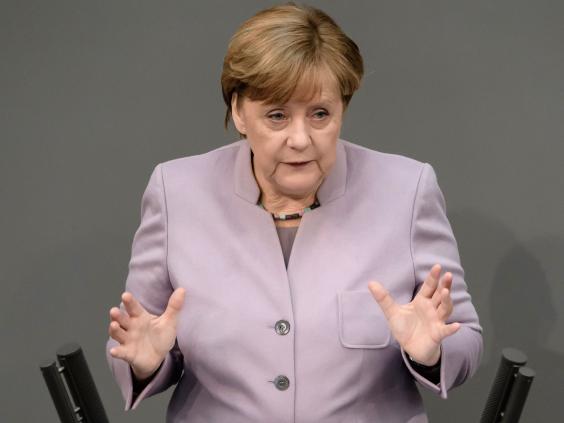Merkel will discuss a number of sensitive issues including women’s rights and refugees whilst also boosting business ties
RIYADH, Saudi Arabia (AP) — German Chancellor Angela Merkel arrived on Sunday in Saudi Arabia, where she is expected to press royals on a number of sensitive issues, including taking in refugees, while also boosting important business ties in her first visit to the country in seven years.
Merkel met King Salman in the Red Sea city of Jiddah and is scheduled to visit the United Arab Emirates on Monday. Saudi Arabia and the UAE are Germany’s largest trading partners in the Middle East.
During her talks with Gulf leaders, Merkel is expected to press them to do more to take in refugees and provide humanitarian relief for those fleeing conflict in Muslim-majority countries. Her country has provided refuge to hundreds of thousands of people from Syria, Iraq and Afghanistan in recent years.
Merkel is also expected to raise the issue of Saudi Arabia’s funding for religious institutions that may be spreading a fundamentalist version of Islam around the world, including in countries such as Mali and Niger, said senior German officials who spoke on customary conditions of anonymity.
Saudi Arabia recently closed several institutional establishments in Germany following pressure from Berlin, including the private King Fahd Academy in the southern suburbs of Bonn. German authorities had previously expressed concern the school might be used to spread fundamentalist ideology.
Like other high-profile female visitors, Merkel did not cover her hair or wear a traditional flowing black robe upon arrival in the kingdom. She is expected to meet Saudi businesswomen during her two-day visit in a sign of support for women’s rights.
Merkel herself backs a ban in Germany on civil servants wearing face veils and on the face cover being worn in public schools, courts and while driving. Most Saudi women wear the full face veil, known as the niqab, in line with the kingdom’s conservative Wahhabi interpretation of Islam.
Merkel is traveling with a business delegation that includes CEOs of major German companies. The kingdom is seeking to attract investment and diversify its economy away from oil, the backbone of its economy.
The official Saudi Press Agency reported the two sides signed a number of memorandums to enhance cooperation in the fields of technology, energy, business and security.
Despite a drop in oil prices that has forced the kingdom to curb spending, Saudi Arabia remains among the world’s top spenders on defense equipment. While there is no German moratorium on weapons exports to Saudi Arabia, the German government does review deals on a case-by-case basis to ensure any defense equipment sold cannot be used for internal repression.
Saudi Arabia’s war in Yemen is also expected to feature in Merkel’s talks with the kingdom’s royals. For more than two years, the kingdom has been bombing Yemeni rebels aligned with Saudi Arabia’s regional Shiite rival, Iran.
Saudi Arabia and Iran also back opposite sides of the conflict in Syria. Germany was one of six international powers that negotiated a nuclear deal with Iran that Saudi Arabia objected to.
——
Batrawy reported from Dubai, United Arab Emirates. Associated Press writer Frank Jordans contributed from Berlin.



